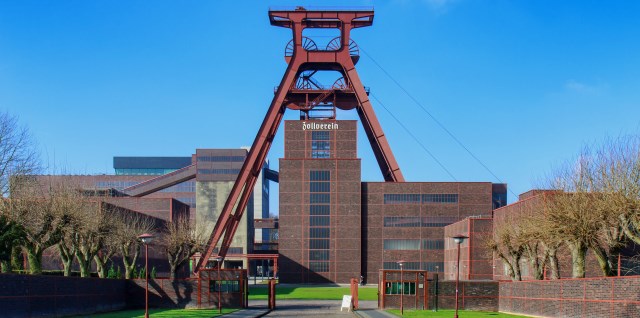Over at the Washington Post, environmental blogger Brad Plumer rightly points out the social responsibility we have in the switch from old technologies (coal power) to new ones (renewables). Germany has quite a bit of experience switching coal miners to green jobs, and Craig Morris knows the German word for it: Strukturwandel, or structural change.

Proud witness of German Strukturwandel – Zeche Zollverein in Essen, former mining complex and today UNESCO world heritage site and exhibition space. (Photo by Adva, CC BY-SA 3.0)
“What will happen to the hundreds of thousands of currently retired coal miners who still rely on [coal] companies for pensions and health benefits?” Plumer asks. The situation is a bit different in Germany, where a national pension insurance plan (Pensionssicherungsverein) ensures pension benefits after bankruptcy. But that is social policy – let’s focus here on how coal firms can avoid bankruptcy altogether by switching to renewables.

The number of green jobs created in Germany far exceeds the number of jobs lost in the conventional energy sector up to now.
Increasingly, the mining of hard coal in Germany had to be subsidized over the past few decades as the mines went ever deeper and extraction prices rose ever higher above import prices. The result has been a switch from domestic hard coal production to coal imports, with coal miners being hit hardest. Subsidies for hard coal mining expire in Germany in 2018.
The German mining company RAG responded by installing wind turbines and solar arrays and by planting energy crops on disused sites. The coal firm co-founded montanSolar as a project developer for solar farms. In its first project, more than 3.5 megawatts was installed across seven hectares last year, and an additional 100 hectares is reportedly available for additional projects according to the developer’s website. At that rate, the firm would install more than 50 megawatts of PV in the next few years.
In 2009, RAG turned some 14,000 square meters of a former mining site closed three years earlier into a biomass center, including a cogeneration plant running on locally produced, untreated timber. What’s more, disused underground mines could be used as pump-storage facilities to store excess renewable power; the firm puts the potential in the Ruhr Area alone at up to 400-600 megawatts. RAG is thus taking steps in the right direction – and is still in business.
Today, areas like the Ruhr Area, Saarland, and Lusitania (a brown coal mining area that is now home to Germany’s four largest solar farms) continue to struggle with relatively high unemployment, but German politicians are focusing on structural change – including to renewables – to ensure that these areas remain healthy.
Perhaps that is the biggest difference between Germany and the US. The American landscape is littered with ghost towns, and we have accepted the demise of such once great cities as Detroit and New Orleans as natural events.
The Ruhr Area was occupied by the French after World War I; Saarland was poised to become an independent country after World War II, but the population rejected the plan and voted to become German again in 1955; and Lusitania was in East Germany – and we saw how eager the country was to reunite after the Fall of the Wall.
Germans want to work together and don’t want any part of their country to fail. That feeling of solidarity is apparently stronger than any ideological differences over old versus new energy.
Craig Morris (@PPchef) is the lead author of German Energy Transition. He directs Petite Planète and writes every workday for Renewables International.
[…] I wrote about Strukturwandel (structural change), the German campaign to transition away from conventional heavy-industry […]
Dear,
I’m interested to read some publications about jobs and renewables.
I’m more focused on the photovoltaïc activity and impact on new/older employment and competences (as well qualitative as quantitative).
Do you have some good studies (in English or french) to recomand me?
Thank you!